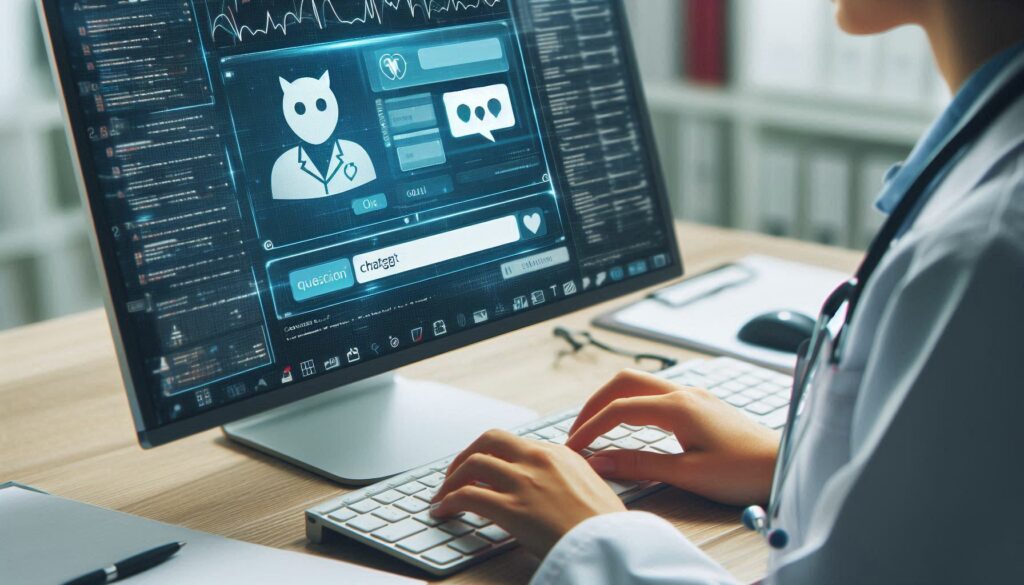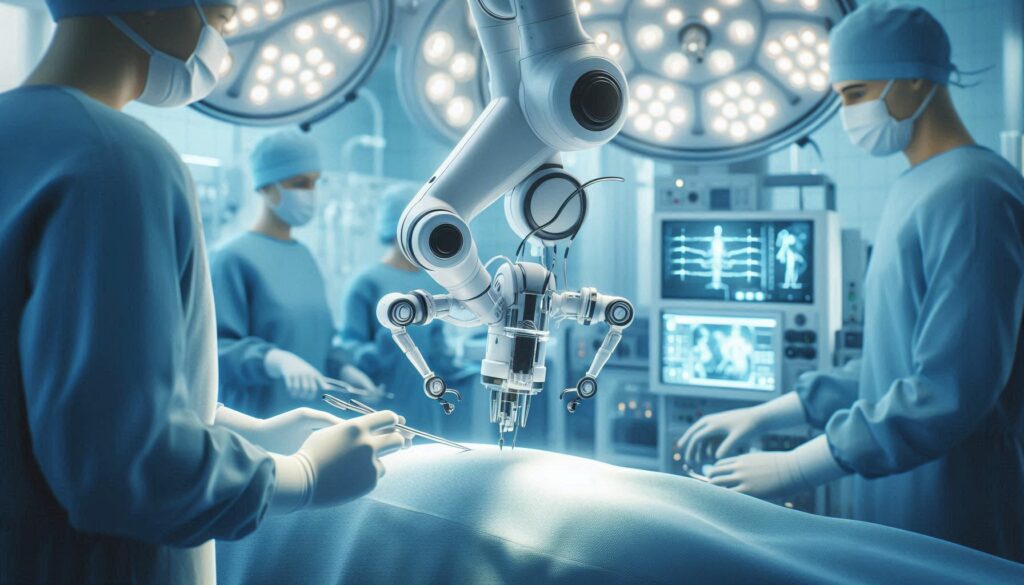
AI CERTS
7 months ago
AI in Healthcare: How ChatGPT is Transforming Bedside Manner
Artificial intelligence (AI) is making waves across various industries, but its impact on healthcare is particularly remarkable. One standout example is ChatGPT, an AI language model developed by OpenAI. This innovative tool is not just about crunching numbers and diagnosing diseases; it's also transforming how we communicate with patients. Let’s dive into how AI in healthcare is reshaping patient care, improving communication, and fostering a new era of collaboration between humans and machines.

The Rise of AI in Healthcare
Back in the early 2000s, I remember being a medical student filled with optimism about the future. I thought that the human aspects of medicine like compassion, empathy, and effective communication would always set doctors apart from machines. Sure, technology was already helping with diagnoses and treatment plans, but could it ever really connect with patients on a human level? Fast forward to today, and I find myself reassessing that belief.
AI in healthcare has come a long way, and tools like ChatGPT are proving that they can not only assist with technical tasks but also excel in delivering compassionate communication. Studies have shown that ChatGPT’s responses to patient inquiries are often rated as more empathetic and helpful than those of real doctors.
ChatGPT’s Bedside Manner
AI in healthcare isn’t just about machines doing the heavy lifting; it’s also about providing emotional support when patients need it most. Picture this: you're sitting in a doctor's office, anxiously awaiting news about your health. It's a vulnerable moment, and you’re hoping for someone who can communicate not just the facts but also provide reassurance and compassion. That’s where ChatGPT shines.
During my training, we learned how to communicate bad news sensitively. We had guidelines to avoid jargon, simplify complex terms, and make sure patients felt supported. ChatGPT, with its ability to follow such scripts flawlessly, is proving capable of delivering emotionally charged messages in a thoughtful, supportive manner often outperforming human doctors.
The Power of AI in Empathetic Communication
While human doctors rely on their experiences and instincts, ChatGPT uses established guidelines to provide empathetic responses. These are based on extensive research about effective communication during difficult conversations. Because ChatGPT executes these scripts flawlessly every time, it ensures that patients feel heard and understood, even in tough situations.
The Key Benefits of AI in Healthcare
The rise of artificial intelligence in healthcare brings a treasure trove of benefits, especially when it comes to patient care. Here’s a quick look at some of the key advantages of using AI tools like ChatGPT in healthcare settings:

Benefits of AI in Healthcare
- Faster, more accurate diagnoses: AI tools like ChatGPT can analyze symptoms and provide detailed treatment plans quickly.
- Clearer doctor-patient communication: AI helps break down complicated medical jargon, making it easier for patients to understand their conditions.
- Reduced workload for doctors: By handling routine tasks like note-taking and patient communication, AI allows doctors to focus on more complex medical issues.
- Emotional support for patients: ChatGPT can deliver empathetic responses in difficult situations, providing patients with emotional reassurance.
By embracing AI in healthcare, doctors can offer patients both technical expertise and the compassionate communication they need.
AI and Human Collaboration in Healthcare
The emergence of AI in healthcare isn’t a sign that doctors will be replaced; instead, it opens up opportunities for collaboration. Imagine a scenario where doctors leverage AI tools like ChatGPT to explain medical conditions in a clear and caring manner, while the AI takes care of the nitty-gritty tasks like documentation and data analysis. This teamwork enhances the overall patient experience.
AI as a Partner, Not a Replacement
Doctors are crucial for making complex medical decisions that require intuition and human touch. While AI excels at procedural tasks, it’s the human element that builds trust and rapport with patients. By working together, AI and healthcare professionals can create a more effective and compassionate healthcare system.
Ethical Considerations: Can AI Replace Human Empathy?
With the growing presence of AI in healthcare, it’s natural to question its role in delivering genuine empathy. Can machines understand and replicate human emotions? While ChatGPT can simulate empathetic responses, it doesn’t experience feelings. Many believe that while AI can mimic compassion, it cannot replace the authentic connection that comes from human interaction.
If you’re interested in deepening your knowledge of AI in healthcare, consider checking out the AI Healthcare Certification to enhance your professional expertise.
The Human Element in Healthcare
At the end of the day, many patients still value the genuine empathy that human doctors bring to the table. A doctor’s ability to connect with patients often stems from shared experiences and an understanding of emotional qualities that AI, no matter how sophisticated, cannot fully replicate.
Overcoming AI’s Limitations in Healthcare
While AI in healthcare has made great strides, it’s essential to recognize its limitations. AI tools like ChatGPT rely on existing data and programmed guidelines, meaning they lack the creativity and intuition that human doctors possess. In a field where each patient is unique, this limitation can be significant.
Moreover, AI is only as good as the data it’s trained on. If the training data is biased or incomplete, the AI-generated responses might not be accurate. Ensuring that AI models are trained on diverse and comprehensive datasets is crucial to providing equitable patient care. For more information on the ethical considerations of AI in healthcare, check out this guide on healthcare AI ethics.
The Future of AI in Healthcare
Looking ahead, the future of AI in healthcare is bright. As artificial intelligence continues to evolve, it will take on even more significant roles in diagnosis, treatment planning, and patient communication. Imagine a world where AI can assist in surgeries or provide real-time monitoring for patients this isn’t just a dream; it’s on the horizon. Robotic surgery is one area seeing substantial growth, where AI plays a key role in assisting with procedures. Learn more about this innovation in robotic surgery.

A Growing Collaboration
Doctors like me are already getting ready for this future, seeing AI as a powerful ally in providing better patient care. By letting AI handle routine tasks, we can focus more on the complex, personalized treatments that require a human touch. The future of AI in healthcare will likely be one of teamwork, where both humans and AI work together to improve patient outcomes.
Conclusion:
As AI technology continues to advance, its role in healthcare is becoming increasingly profound. ChatGPT’s ability to deliver compassionate communication is revolutionizing the way we interact with patients. While AI may never fully replace the human touch, it’s clear that a collaborative approach offers the best of both worlds technical precision and heartfelt support.
As we embrace AI alongside our medical expertise, the future of healthcare will be compassionate, efficient, and incredibly promising. Together, we can create a system that prioritizes both the emotional and physical well-being of patients.
Want to learn more about AI's role in healthcare? Dive deeper into our Complete Guide to AI in Healthcare for insights on how AI is reshaping the future of medicine.
Source: I’m a Doctor. ChatGPT’s Bedside Manner Is Better Than Mine.
Here are our other articles you might be interested: